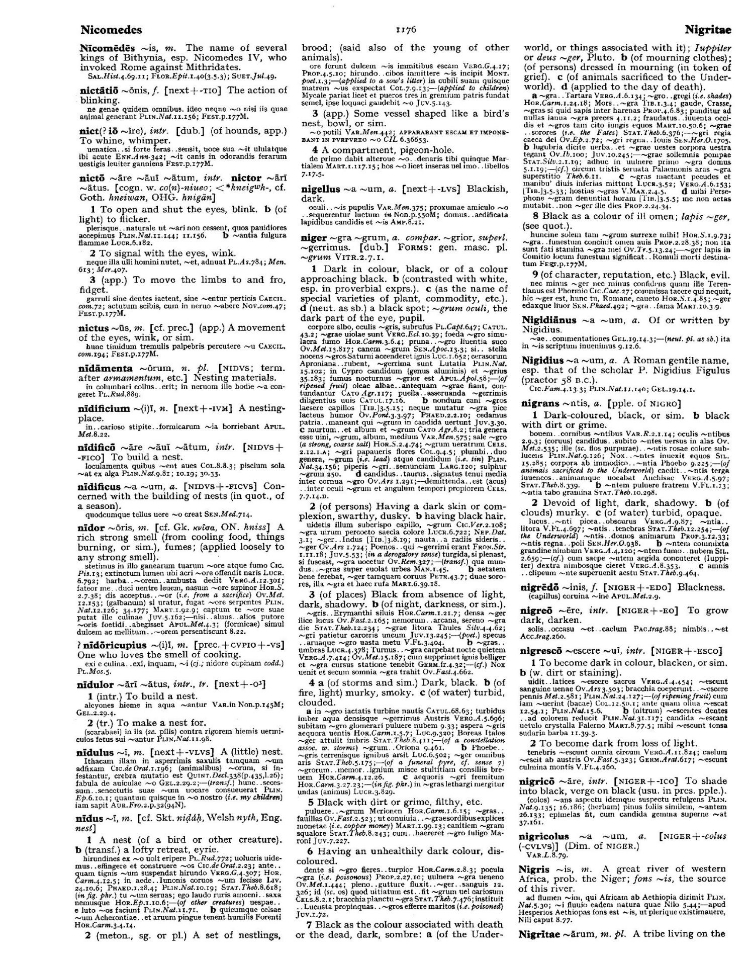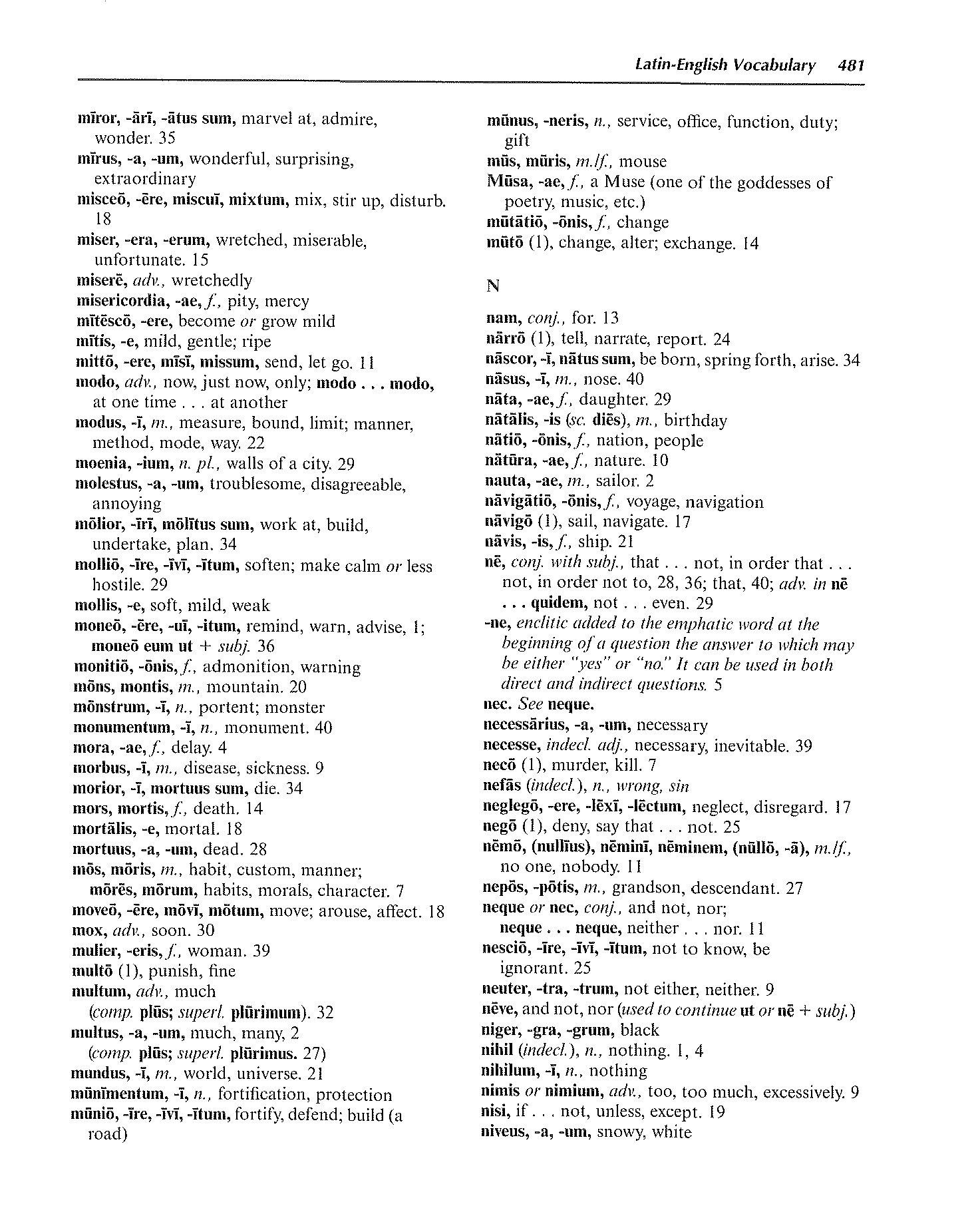
page_listing.tpl
page_subListingDetails.tpl
sub_listingDetails_style1.tpl
sub_listingDetails.title.tpl
niger black
niger is a Latin Adjective that primarily means black.
Definitions for niger
Wheelock's Latin
Adjective
- 1
black
Oxford Latin Dictionary
Noun
- 1
Dark in colour, black, or of a colour approaching black. (b) (contrasted with white, esp. in proverbial exprs.) (c) (as the name of special varieties of plant, commodity, etc.). (d) (neut. as sb.) a black spot; ~grum oculi, the dark part of the eye, pupil.
- 2
(of persons) Having a dark skin or complexion, swarthy, dusky. (b) having black hair.
- 3
(of places) Black from absence of light, dark, shadowy. (b) (of night, darkness, or sim.).
Sentences with niger
Latin to English
Absentem qui rodit amicum, qui non defendit alio culpante, solutos qui captat risus hominum famamque dicacis, fingere qui non visa potest, commissa facere qui nequit: hic niger est, hunc tu, Romane, caveto.Compare The man who backbites an absent friend, nay, who does not stand up for him when another blames him, the man who angles for bursts of laughter and for the repute of a wit, who can invent what he never saw, who cannot keep a secret - that man is black at heart: mark and avoid him, if you are a Roman.
Duris ut ilex tonsa bipennibus nigrae feraci frondis in Algido per damna, per caedes ab ipso ducit opes animumque ferro.Compare Like the holm-oak shorn by ruthless axes on Algidus where black leaves grow thick, through loss, through havoc, from the very edge of the steel draws new strength and heart.
Nominibus mollire licet mala, fusca vocetur nigrior Illyrica cui pice sanguis erit. Si Paeta est, Veneri similis. Si flava, Minervae, sit gracilis macie quae male viva sua est. dic habilem quaecumque brevis; quae turgida, plenam; et lateat vitium proximitate boni.Compare With names you soften shortcomings; let her be called swarthy whose blood is blacker than Illyrian pitch; if cross-eyed, she is like Venus; yellow haired, like Minerva; call her slender whose thinness impairs her health; if short, call her trim; if stout, of full body; let its nearness to a virtue conceal a fault.
Data sources
Notes
- Definitions
- Frederick M. Wheelock, Wheelock's Latin, 6th ed., rev. Richard A. LaFleur (New York, NY: HarperCollins Publishers, 2005): 481.
- P. G. W. Glare, Oxford Latin Dictionary, Vols. 1-8 (Oxford: Clarendon Press, 1982): 1176.
- Word frequencies
- Christopher Francese, "Latin Core Vocabulary," Dickinson College Commentaries, last modified 2014, http://dcc.dickinson.edu.
- Paul B. Diederich, The Frequency of Latin Words and Their Endings, PhD diss., (Columbia University, 1939).
- Louis Delatte, Suzanne Govaerts, Joseph Denooz, and Etienne Evrard, Dictionnaire fréquentiel et index inverse de la langue latine [Frequency Dictionary and Inverse Index of the Latin Language] (Liège, Belgium: Laboratoire d'analyse statistique des langues anciennes de l'Université de Liège [L.A.S.L.A.], 1981): 119-219.
Bibliography
Allen, Joseph H. Allen and Greenough's New Latin Grammar for Schools and Colleges: Founded on Comparative Grammar. Edited by James B. Greenough, George L. Kittredge, Albert A. Howard, and Benjamin L. D'Ooge. Boston, MA: Ginn & Company, 1903.
Crystal, David. A Dictionary of Linguistics and Phonetics. 6th ed. Oxford, UK: Blackwell Publishing, 2008.
Delatte, Louis, Suzanne Govaerts, Joseph Denooz, and Etienne Evrard. Dictionnaire fréquentiel et index inverse de la langue latine [Frequency Dictionary and Inverse Index of the Latin Language]. Liège, Belgium: Laboratoire d'analyse statistique des langues anciennes de l'Université de Liège (L.A.S.L.A.), 1981.
Diederich, Paul B. The Frequency of Latin Words and Their Endings. PhD diss., Columbia University, 1939.
Francese, Christopher. "Latin Core Vocabulary." Dickinson College Commentaries. Last modified 2014. http://dcc.dickinson.edu/latin-vocabulary-list.
Gildersleeve, Basil L., and Gonzales Lodge. Gildersleeve's Latin Grammar: Third Edition, Revised, and Enlarged. 3rd ed. London, England: Macmillan and Co., 1903.
Glare, Peter G.W. Oxford Latin Dictionary. Vols. 1-8. Oxford, England: Clarendon Press, 1982.
Krüger, Bernd. "Latin Conjugation Tables." Cactus2000. Accessed May 5, 2023. https://latin.cactus2000.de/index.en.php.
Pierson, Nick. "Sound of Text." Accessed October 26, 2019. https://soundoftext.com.
Wheelock, Frederick M. Wheelock's Latin. 6th ed. Revised by Richard A. LaFleur. New York, NY: HarperCollins Publishers, 2005.
Wiktionary Contributors. "Victionarium." Wikimedia Foundation, Inc. Updated March 18, 2019. https://la.wiktionary.org/wiki/Victionarium:Pagina_prima.
Citation
Chicago (17th ed.)
Allo Contributors. "niger, nigra, nigrum (adj.) - Latin Word Definition." Allo Latin Dictionary. Last modified . Accessed February 20, 2026. http://ancientlanguages.org/latin/dictionary/niger-nigra-nigrum.
Entry created on . Last updated on .







